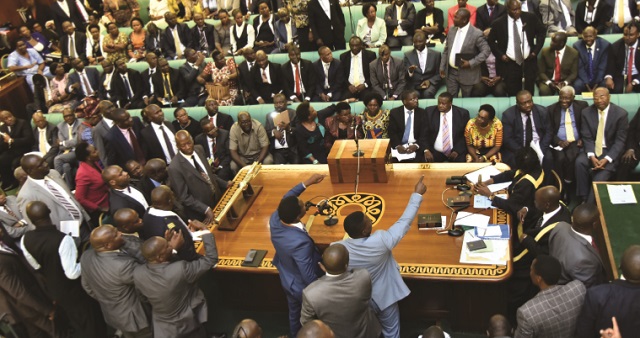
NGO Forum report punches holes in first session performance of current parliament
Kampala, Uganda | FLAVIA NASSAKA | September 27, 2017 will go down in history of Uganda’s parliament. It marked the climax of three days of `legislative violence’ when MPs brawled over a decision by the Speaker Rebecca Kadaga to suspend 25 of their colleagues from the house so that the process to remove the presidential age-limit from the constitution could start. Removing the age-limit is designed to ensure that President Yoweri Museveni, who has been in power for 32 years, can run again in 2021. He will be 77 years old then, and the current constitution bars anyone above 75 years old from contesting for presidency.
Kadaga ordered the MPs who had engaged in two days of continuous brawling and wearing red bandanas in parliament as a form of political blockage of the so-called Anti-age limit Bill to leave the House but they disobeyed her order. The situation degenerated from a brawl to a melee when she ordered the parliamentary security and soldiers from President Museveni special force to forcefully evict the opposition MPs. Some MPs collapsed in shock, many cried in pain, while legs and arms were broken and sprained as the security forces carted the MPs out kicking and screaming.
Ironically, however, as the melee was going on in parliament, a consortium of Civil Society Organisations (CSOs), the Uganda National NGO Forum, was also launching a report showing just how unproductive the current parliament has been.
Titled, `A baseline for the 10th parliament watch bulletin’, the report rated the MPs on several parameters including assessment of their legislative role, the oversight role over the government, representation of issues affecting their voters, and their role in the fight against corruption. On each parameter, respondents were asked to choose from any of the options – Very low, Low, Fair, High or Very high.
On the legislative productivity of parliament, based on self-assessment by members of parliament, the current parliament scored only 40% and 46% according to other respondents. Then whereas one in every five people in western Uganda rated parliament high in legislative role, none of the communities in Eastern, Central and northern region gave a high rating.
On its oversight role, the legislators 50% rated the parliament as low and another 75% assessed them to be low on being accountable to the citizens. Up to 91% of respondents, however, said the MPs representation was low with some saying their MPs have never gone back to their constituencies from the time they were elected in 2016.
When it comes to legislating, the current parliament has passed 35 bills in the first session with more than half being spill overs from the 9th parliament. Some of the bills passed include the Local Government Amendment Bill 2016, the Anti-Terrorism Amendment Bill 2017 and the Income Tax amendment Bill 2016.
No private members’ Bills were passed although four motions were passed for introducing private members’ bills. 18 Bills were pending by the time the session closed.
To Sabiti Makara; a Makerere University based professor of Political Science, this bad performance is not surprising because, to him, the quality of MPs has been going down. He says the 6th parliament was the best as it used to investigate issues that resulted in impeachment of government officials.
“Now parliament has been reduced to mere politicking,” he said.
 The Independent Uganda: You get the Truth we Pay the Price
The Independent Uganda: You get the Truth we Pay the Price



